反义疑问句句型归纳
反意疑问句
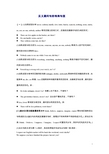
反义疑问句的特殊句型(一)(1)当陈述部分有never,seldom, hardly,few,little,barely, scarcely, nothing,none, rarely, no, not, no one, nobody, neither等否定意义的词汇时,后面的反意疑问句则为肯定形式:●There are few apples in the basket, are there?●He can hardly swim, can he?●They seldom come late, do they?(2)当陈述部分的主语为everyone, someone, anyone, no one, nobody等表示人的不定代词时,疑问部分的主语常用they:●Nobody came to see me while I was out, did they?(3)当陈述部分的主语为everything, something, anything, nothing等表示物的不定代词时,疑问部分的主语用it:●Something is wrong with your watch, isn’t it?(4)当陈述部分含有否定意思的词是unhappy, dislike, unfriendly,等含有否定词缀的派生词,也就是有un, dis-, no-前缀、less-后缀等含有词缀而意思否定的词,当做肯定句处理,疑问部分要用否定形式。
如:●He looks unhappy, doesn’t he? 他看上去不高兴,不是吗?●The girl dislikes history, doesn’t she? 这女孩不喜欢历史,不是吗?有less, fewer等词视为肯定词,疑问部分用否定形式。
如:●There will be less pollution, won't there?(二)表示主语主观意愿的词含有think, believe, suppose, imagine, expect等动词后接宾语从句构成的主从复合句在构成反意疑问句时,视情况不同有两种不同的构成方式。
反义疑问句的用法归纳及回答举例

反义疑问句的用法归纳及回答举例
1. 哎呀呀,反义疑问句就是在陈述句后面加上一个简短问句呀!比如“你喜欢看书,不是吗?”,这里就是先陈述“你喜欢看书”,然后问“不是吗”。
2. 咱要注意哦,如果前面陈述句是肯定的,后面的反义疑问句就要用否定形式呢。
就像“他很聪明,不是吗?”。
3. 反过来,如果前面是否定陈述句,那后面的反义疑问句就得是肯定的啦!比如“她今天没来,对吧?”。
4. 回答的时候可别糊涂呀!要是同意就说“是呀”或“对呀”,不同意就直接说“不是”。
就好像人家问“今天天气不错,不是吗?”,觉得对就说“是呀”。
5. 有时还会遇到特殊情况呢,像“Let's go shopping,shall we?”这时候就得用“shall we”呀。
6. 还有那种祈使句的反义疑问句呢,“别跑太快,好吗?”就是一种呀。
7. 哎呀,这反义疑问句用法不复杂吧,一学就会啦!就像学骑自行车,掌握了技巧就没问题啦!
8. 记住这些要点,以后再遇到反义疑问句就不怕啦!反义疑问句其实挺好玩的呀,能让我们的交流更有趣不是吗?我觉得掌握反义疑问句真的很有用,能让我们的表达更丰富呢。
反义疑问句规则
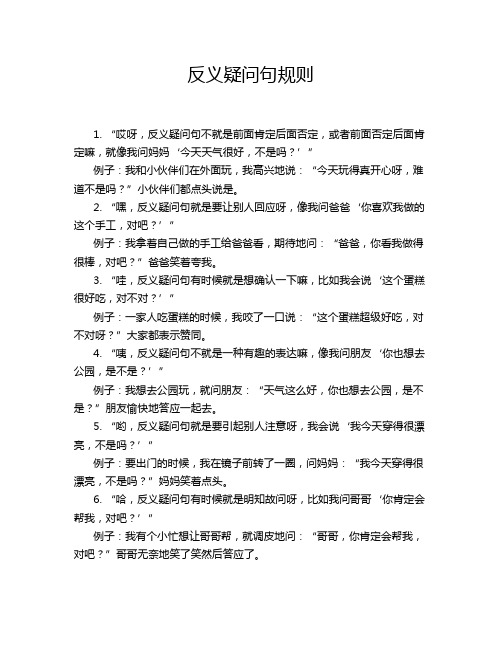
反义疑问句规则1. “哎呀,反义疑问句不就是前面肯定后面否定,或者前面否定后面肯定嘛,就像我问妈妈‘今天天气很好,不是吗?’”例子:我和小伙伴们在外面玩,我高兴地说:“今天玩得真开心呀,难道不是吗?”小伙伴们都点头说是。
2. “嘿,反义疑问句就是要让别人回应呀,像我问爸爸‘你喜欢我做的这个手工,对吧?’”例子:我拿着自己做的手工给爸爸看,期待地问:“爸爸,你看我做得很棒,对吧?”爸爸笑着夸我。
3. “哇,反义疑问句有时候就是想确认一下嘛,比如我会说‘这个蛋糕很好吃,对不对?’”例子:一家人吃蛋糕的时候,我咬了一口说:“这个蛋糕超级好吃,对不对呀?”大家都表示赞同。
4. “咦,反义疑问句不就是一种有趣的表达嘛,像我问朋友‘你也想去公园,是不是?’”例子:我想去公园玩,就问朋友:“天气这么好,你也想去公园,是不是?”朋友愉快地答应一起去。
5. “哟,反义疑问句就是要引起别人注意呀,我会说‘我今天穿得很漂亮,不是吗?’”例子:要出门的时候,我在镜子前转了一圈,问妈妈:“我今天穿得很漂亮,不是吗?”妈妈笑着点头。
6. “哈,反义疑问句有时候就是明知故问呀,比如我问哥哥‘你肯定会帮我,对吧?’”例子:我有个小忙想让哥哥帮,就调皮地问:“哥哥,你肯定会帮我,对吧?”哥哥无奈地笑了笑然后答应了。
7. “呐,反义疑问句就是这样的啦,像我问妹妹‘你也喜欢看动画片,是不是?’”例子:我和妹妹在看电视,我问她:“你也喜欢看动画片,是不是?”妹妹开心地说喜欢。
8. “嘿呀,反义疑问句能让对话更有意思呢,我会说‘你不会不喜欢吃冰淇淋吧?’”例子:我拿着冰淇淋问小伙伴:“这么好吃的冰淇淋,你不会不喜欢吃吧?”小伙伴赶紧说喜欢。
9. “哎呀呀,反义疑问句就是这样特别呀,像我问奶奶‘您最疼我了,对吧?’”例子:我依偎在奶奶身边,撒娇地问:“奶奶,您最疼我了,对吧?”奶奶满脸慈爱地说是。
10. “哇塞,反义疑问句可太有用啦,比如我问同学‘明天要上学,对吧?’”例子:放学的时候,我和同学讨论,我说:“明天要上学,对吧?”同学也说是呀。
英语反义疑问句的问句与回答归纳

英语反义疑问句用法讲解一、基本概念及结构:反义疑问句又叫附加疑问句,是指当提问的人对前面所叙述的事实不敢肯定,而需要向对方加以证实时所提出的问句。
其结构为:前一部分是一个陈述句,后一部分是一个简短的问句。
完成后一部分简短问句时,要根据前面陈述句的动词时态和人称来选择适当的助动词进行提问,前后两部分的人称和动词时态要保持一致。
如果前一部分用肯定式,后一部分一般用否定式;反之,前一部分为否定式,后一部分要用肯定式,即“前肯定后否定,前否定后肯定”。
例如:You don’t like rock music, do you 你不喜欢摇滚乐,对吧二、反义疑问句的回答不管是前否后肯,还是前肯后否形式的反义疑问句,回答都根据事实回答,肯定的答案就用yes+肯定结构,否定的答案就用no+否定结构,答案要和实际情况相符。
也叫实事求是例如:1、--She is good at English, isn't she--Yes, she is. 是的,她擅长或者No, she isn't.不,她不擅长2、--There isn't a computer in your r oom, is there“你的房间里没有电脑,对吗?-- Yes, there is.不,有电脑或者 No,there isn't.是的,没有电脑。
三、其他规则:1、陈述部分用否定词或半否定词 no , nothing, nobody, never, few, seldom, hardly, rarely, little 等否定含义的词时,疑问部分用肯定形式。
例如:He is never late for school, is he?他上学从不迟到,是吗2、陈述部分的谓语是used to 时,疑问部分用didn’t +主语或 usedn’t +主语。
例如:He used to take pictures there, didn’t / usedn’t he 他过去常常在那儿拍照,是吗You used to sleep with the windows open, usedn’t/ didn’t you你过去常常开着窗户睡觉,是吗?3、陈述部分为祈使句时,祈使句后加附加问句,不表示反意,而表示一种语气。
反义疑问句的句型

反义疑问句的句型
1. 你知道“今天天气真好,不是吗?”这就是一个反义疑问句呀!比如大家一起出去玩,有人说“这地方真好玩啊”,然后接着来一句“不是吗”,是不是感觉很自然?
2. 难道你没听过“他很厉害,对吧?”这种句子吗?就像朋友在你面前展示一项技能,然后问你“我厉害吧,对吧?”。
3. “你应该会做饭,不是吗?”,这太常见啦!就像妈妈问孩子“你都这么大了,应该会做饭,不是吗?”。
4. 有没有觉得“那本书很有趣,不是吗?”这样的反义疑问句很亲切?比如在读书分享会上,有人推荐一本书后说“那本书真的很有趣,不是吗?”。
5. “你喜欢这部电影,对吧?”,哎呀,这不就是我们平时会说的嘛!像和朋友看完电影后会问“你喜欢这部电影,对吧?”。
6. “这件衣服很漂亮,不是吗?”多形象啊!比如在服装店试衣服,自己会说“这件衣服很漂亮,不是吗?”。
7. “你不会生气了吧,不是吗?”,这种时候常常会这么问呀!就像和朋友开玩笑后担心他生气,就会问一句“你不会生气了吧,不是吗?”。
8. “这个蛋糕很好吃,对吧?”,想想在吃蛋糕的时候,是不是很容易就说出这句话呢!
9. “他肯定能做好,不是吗?”,就好像对别人充满信心时会说“他那么厉害,肯定能做好,不是吗?”。
10. “你已经准备好了,对吧?”,比如要去参加一个活动,会问伙伴“你已经准备好了,对吧?”。
我的观点结论:反义疑问句在我们的日常交流中真的太常见啦,它能让对话更自然、更亲切,也能更好地表达我们的情感和态度。
反义疑问句的类型

反义疑问句一、反义疑问句概念:反意疑问句是附加在陈述句之后,对陈述句所表示的事实或观点提出疑问的句子.附加疑问实际上是一种简略的一般疑问句.反意疑问句=陈述句+一般疑问句两种情况:(1)肯定陈述句+否定的一般疑问句“前肯后否”(2)否定陈述句+肯定的一般疑问句“前否后肯”二、反义疑问句类型1. 陈述句含有助动词、情态动词、be动词的情况:A. 肯定陈述句(主语+助动词/情态动词/be动词+其他), 否定一般疑问句(助动词/情态动词/be动词+ not +主语/代词)·He is your teacher, isn't he? (be动词)·She does her homework everyday, doesn't she? (助动词)·They have a house in town, haven't they? (情态动词)·You'd better change your wet skirt, hadn't you? (情态动词)B. 否定陈述句(主语+助动词/情态动词/be动词),肯定一般疑问句(助动词/情态动词/be动词+ not +主语/代词)People shouldn't drop litter on the pavements, should they?(情态动词)There wasn't enough time at that moment, was there? (be动词)He doesn't do the work, does he? (助动词)2. 陈述句含有实义动词的情况:A. 肯定陈述句(主语+实义动词+其他),否定的一般疑问句(助动词do/does/did + not +主语/代词)·You found the key in the bedroom,didn't you?·Everybody knows the answer, don't they?B. 否定陈述句(主语+do/does/did + not+实义动+其他),肯定的一般疑问句(助动词do/does/did+主语/代词+其他)·Your mother doesn't like apple, does she?3. 特殊句型的反意疑问句(1)陈述句含有I +be动词句型,附加疑问句用are / aren't+ I回答。
反义疑问句知识点
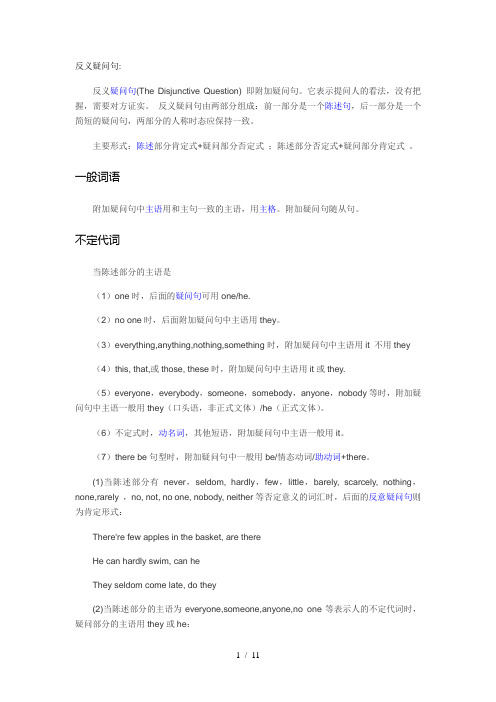
反义疑问句:反义疑问句(The Disjunctive Question) 即附加疑问句。
它表示提问人的看法,没有把握,需要对方证实。
反义疑问句由两部分组成:前一部分是一个陈述句,后一部分是一个简短的疑问句,两部分的人称时态应保持一致。
主要形式:陈述部分肯定式+疑问部分否定式;陈述部分否定式+疑问部分肯定式。
一般词语附加疑问句中主语用和主句一致的主语,用主格。
附加疑问句随从句。
不定代词当陈述部分的主语是(1)one时,后面的疑问句可用one/he.(2)no one时,后面附加疑问句中主语用they。
(3)everything,anything,nothing,something时,附加疑问句中主语用it 不用they(4)this, that,或those, these时,附加疑问句中主语用it或they.(5)everyone,everybody,someone,somebody,anyone,nobody等时,附加疑问句中主语一般用they(口头语,非正式文体)/he(正式文体)。
(6)不定式时,动名词,其他短语,附加疑问句中主语一般用it。
(7)there be句型时,附加疑问句中一般用be/情态动词/助动词+there。
(1)当陈述部分有never,seldom, hardly,few,little,barely, scarcely, nothing,none,rarely ,no, not, no one, nobody, neither等否定意义的词汇时,后面的反意疑问句则为肯定形式:There're few apples in the basket, are thereHe can hardly swim, can heThey seldom come late, do they(2)当陈述部分的主语为everyone,someone,anyone,no one等表示人的不定代词时,疑问部分的主语用they或he:Everyone in your family is a teacher, aren’t they\isn't he?(3)当陈述部分的主语为everything,something,anything.nothing等表示物的不定代词时,疑问部分的主语用it:Something is wrong with your watch, isn’t it(4)当陈述部分含有否定意思的词是unhappy,dislike,unfriendly,等含有否定词缀的派生词,也就是有un,dis,no-前缀、-less后缀等含有词缀而意思否定的词,当做肯定句处理,疑问部分要用否定形式。
英语反义疑问句24式

一、反意疑问句中问句部分的动词与陈述部分的动词在语气上成相反的对应关系,即:肯定+否定?否定+肯定?如:①You can’t do it, can you? ②They are very late for the meeting, aren’t they?二、反意疑问句中问句部分的动词与陈述部分的动词种类要对应一致。
如:①He has supper at home every day, doesn’t he? (不能用hasn’t he?)②They have known th e matter, haven’t they? (不能用don’t they?)三、反意疑问句中问句部分的动词在时态上应和陈述部分的时态一致。
如:①They will go to town soon, won’t they?(不能用don’t they?或aren’t they?)②He works very hard, doesn’t he?(不能用didn’t he?或won’t he?)四、反意疑问句的陈述部分含有由un-, im-, in-, dis-, 等否定意义的前缀构成的词语时,陈述部分要视为肯定含义,问句部分用否定形式。
如:①Your father is unhappy, isn’t he?(不能用is he?)②The man is dishonest, isn’t he? (不能用is he?)③It is impossible to learn English without remembering more words, isn’t it?(不能用is it ?)五、反意疑问句的陈述部分带有little, few, never, hardly, seldom等否定意义的词时,问句部分用肯定式。
如:①She never tells a lie, does she?(不用doesn’t she?)②He was seldom late, was he?(不用wasn’t he?)六、反意疑问句的陈述部分为I am…时,问句部分习惯上用aren’t I?表示。
反义疑问句
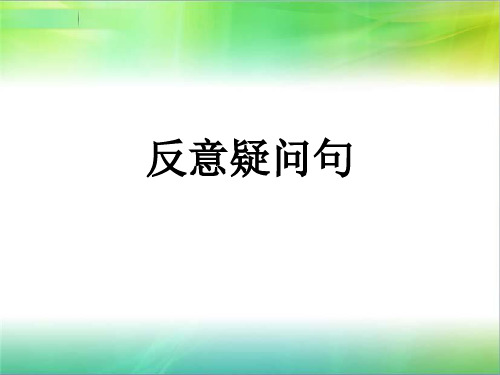
结构
• 反意疑问句是由两部分组成的,前一部分是对事 物的陈述(即陈述句),后一部分是简短的提问 (即简短疑问句),中间用逗号隔开。 • 如果前一部分用肯定句,后一部分就用否定疑问 句;如果前一部分用否定句,后一部分就用肯定 疑问句,也就是所谓的“前否后肯”、“前肯后 否”。两部分的人称和时态要一致。 • 其回答是用yes或no来表示
1: 主+行为V.+其它,don’t /doesn't/didn't +主
You sing very well, don't you?
She speaks English very well, doesn't she?
It rained yesterday, didn't it?
2:
主+
d o n ’ t /doesn't/didn/t + V. 原 形 + 其 它
,do/does/did+主 You don't like playing basketball, do you? She doesn't want to go to the park, does she?
一、含be(is, are, was, we+ be+其它,isn't/aren't/wasn't/weren't+ 主?
Eg .She is so beautiful, isn't she?
2. 主+ be not+其它,is/are/was/were+ 主? Eg .You aren't a student, are you?
反义疑问句用法归纳

反意疑问句用法完全归纳一、基本用法与结构反意疑问句由“陈述句+简略疑问句”两部分组成,第一部分提出一种看法,第二部分用来质疑或表示证实。
陈述部分与疑问部分的动词时态和动词性质应保持一致,而且肯定和否定形式彼此相反,即陈述部分为肯定式时,疑问部分用否定式,陈述部分为否定式时,疑问部分用肯定式:He likes English, doesn’t he? 他喜欢英语,是吗?He doesn’t like English, does he? 他不喜欢英语,是吗?【注】1. 若陈述部分含有seldom, hardly, never, few, nothing等否定词或半否定词,其疑问部分要用肯式:He has few friends here, has he? 他在这儿几乎没什么朋友,是吗?She said nothing, did she? 她什么也没说,是不是?2. 若陈述部分含有带否定前缀的词,疑问部分仍用否定式:It is unfair, isn’t it? 这不公平,不是吗?It is impossible, isn’t it? 那是不可能的,是吗?二、反意疑问句的主语问题1. 基本原则:疑问部分的主语应与陈述部分主语一致,且只能是代词:Mary is a nurse, isn’t she? 玛丽是护士,对吗?2. 当陈述部分为there be句型时,疑问部分仍用there作“主语”:There was nothing in the room, was there? 房间里什么也没有,是吗?3. 当陈述部分的主语是指示代词时,疑问部分用it, they等代词:That is a new car, isn’t it? 这是一辆新汽车,是吗?4. 当陈述部分的主语是复合不定代词时,若陈述部分的主语为somebody, someone, everyone, everybody, no one, nobody等复合不定代词,其反意疑问句的主语在正式文体中用he,在口语或非正式文体中通常用they:Nobody was late, were they? 没有一个人迟到,是吗?5.当陈述部分的主语是 something, anything, nothing, everything等复合不定代词时,其反意疑问句的主语要用it:Everything is ready, isn’t it? 一切都准备好了吗?Nothing is important, is it? 没有什么重要的,不是吗?三、陈述部分有动词have的反意疑问句1. 当have 为助动词时,其反意疑问句沿用同样的助动词:He has already left, hasn’t he? 他已经离开了,是吗?2. 当 have 为实意动词时,要分两种情况:①若表示“所有”,反意疑问句可以用have,也可以用do:He has a lot of friends here, hasn’t [doesn’t] he? 他在这儿有许多朋友,是吗?但是若陈述部分用的是have的否定式,反意疑问句用have 还是用do,取决于陈述部分的动词形式:He hasn’t any money, has he? 他没有钱,是吗?He doesn’t have any money, does he? 他没有钱,是吗?②若表示“吃”、“玩”等意思,反意疑问句要用do:He has supper at 5, doesn’t he? 他5点吃晚餐,是吗?He had a good time at the party, didn’t he? 他在晚会上玩得很开心,是吗?3. 当用于have to时,通常也有两种可能:若表示经常性的行为,则多用加助动词do的形式;若表示特定的行为,则多用have:He often has to get up early, doesn’t he? 他经常要早起,是吗?He has to go to bed late tonight, hasn’t he? 他今晚要迟睡,是吗?四、含情态动词的反意疑问句1. 基本原则:在通常情况下,当陈述部分含有情态动词时,疑问部分会重复前面同样的情态动词:He can speak English, can’t he?他会说英语,是吗?We shouldn’t go, should we? 我们不应该去,对不对?2. 当陈述部分含有must时,要分两种情况:①若must表示“必须”或“有必要”,疑问部分用mustn’t或needn’t:You must leave at once, mustn’t [needn’t] you? 你必须(有必要)马上离开,是吗?但是若陈述部分有mustn’t表示禁止,疑问部分要must:You mustn’t laugh, must you? 你不准笑,知道吗?②若must表示推测,疑问部分不能用must,而应根据must后的动词结构采用相应的动词形式:He must be tired, isn’t he? 他一定累了,是吗?五、陈述部分为祈使句的反意疑问句1. 基本原则:若陈述部分为祈使句,疑问部分通常用will you:Please help us, will you? 请帮帮我们,好吗?Come with us, will you? 同我们一起去,好吗?Don’t forget to post the letter, will you? 请别忘了寄信。
反义疑问句(最全)

4.陈述部分有had better + v. 疑问句部分用hadn’t you? You’d better read it by yourself, hadn’t you? 5.陈述部分是“there be”结构时,疑问部分用there省略主语代词。 There is something wrong with your watch, isn't there? There will not be any trouble, will there? Note: 当为“ there used to be…”句型时,反意问句用didn’t there。
反义疑问句
Question Tags
演讲人姓名
CLICK HERE TO ADD A TITLE
附加疑问句
附加疑问句(Question Tags)又叫反意疑问句。反意疑问句由两部分组成:前一部分是一个陈述句,后一部分是一个简短的疑问句,两部分的人称时态应保持一致。
ห้องสมุดไป่ตู้
question tags
有情态动词的反意疑问句
(一)句中陈述部分没有表示过去的时间状语,这时疑问部分中的动词就用现在完成时。 (haven’t / hasn’t + 主语) You must have told her about it, haven’t you? (二)陈述部分有表示过去的时间状语,疑问部分的动词就用一般过去时。(didn’t + 主语) She must have read the novel last week, didn’t she?
三、特殊句型的反义疑问句: 省去主语的祈使句的反意疑问句,疑问部分用will you。 Don’t do that again, will you? Go with me, will you / won’t you ? 这里就不符合“前否后肯”的原则,而是“前肯后可肯可否” Note : Let‘s 开头的祈使句,后用shall we? Let's go and listen to the music, shall we/shan't we? Let us 开头的祈使句,后用will you? Let us wait for you in the reading-room, will you/won't you?
反义疑问句的用法归纳
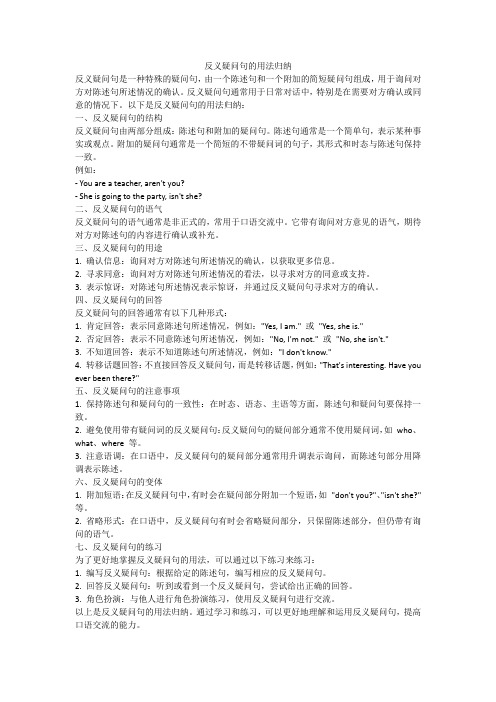
反义疑问句的用法归纳反义疑问句是一种特殊的疑问句,由一个陈述句和一个附加的简短疑问句组成,用于询问对方对陈述句所述情况的确认。
反义疑问句通常用于日常对话中,特别是在需要对方确认或同意的情况下。
以下是反义疑问句的用法归纳:一、反义疑问句的结构反义疑问句由两部分组成:陈述句和附加的疑问句。
陈述句通常是一个简单句,表示某种事实或观点。
附加的疑问句通常是一个简短的不带疑问词的句子,其形式和时态与陈述句保持一致。
例如:- You are a teacher, aren't you?- She is going to the party, isn't she?二、反义疑问句的语气反义疑问句的语气通常是非正式的,常用于口语交流中。
它带有询问对方意见的语气,期待对方对陈述句的内容进行确认或补充。
三、反义疑问句的用途1. 确认信息:询问对方对陈述句所述情况的确认,以获取更多信息。
2. 寻求同意:询问对方对陈述句所述情况的看法,以寻求对方的同意或支持。
3. 表示惊讶:对陈述句所述情况表示惊讶,并通过反义疑问句寻求对方的确认。
四、反义疑问句的回答反义疑问句的回答通常有以下几种形式:1. 肯定回答:表示同意陈述句所述情况,例如:"Yes, I am." 或"Yes, she is."2. 否定回答:表示不同意陈述句所述情况,例如:"No, I'm not." 或"No, she isn't."3. 不知道回答:表示不知道陈述句所述情况,例如:"I don't know."4. 转移话题回答:不直接回答反义疑问句,而是转移话题,例如:"That's interesting. Have you ever been there?"五、反义疑问句的注意事项1. 保持陈述句和疑问句的一致性:在时态、语态、主语等方面,陈述句和疑问句要保持一致。
(完整版)反义疑问句讲解及答案

反义疑问句一.句型解释反义疑问句(The Disjunctive Question):即附加疑问句。
它表示提问人的看法,没有把握,需要对方证实。
反义疑问句由两部分组成:前一部分是一个陈述句,后一部分是一个简短的疑问句,两部分的人称时态应保持一致。
1.陈述部分肯定式+疑问部分否定式2.陈述部分否定式+疑问部分肯定式She was ill yesterday, wasn’t she?You didn’t go, did you?二.特殊的句型1.祈使句。
祈使句后一般加上will you或won't you构成反意疑问句,用will you 多表示“请求”,用won't you 多表示提醒对方注意。
例如:Let引导的祈使句有两种情况:1) Let's...,后的反意疑问句用shall we或shan't we。
例如:Let's go home, shall we/ shan't we? 回家吧,好吗?2)Let us/me...后的反意疑问句用will you或won't you。
例如:Let me have a try, will you/won't you?3)祈使句都用will you 或won’t you2.当陈述部分含I think (believe, suppose...)that... 结构时,其反意疑问句须与从句的主、谓语保持一致,注意主句的主语必须是第一人称。
例如:I don't think he will come, will he?若是非第一人称,则与主句的主语相一致He thinks that she will come, doesn’t he?反意疑问句的陈述部分为I(We) don’t think(believe, suppose, consider)+ that从句时,从句为否定意义,问句部分的动词和主语仍与that从句保持一致且用肯定式。
反义疑问句的八种特殊形式

反义疑问句的八种特殊形式
1. 前面句子为肯定句,后面为否定疑问句。
如:You like coffee, don't you?(你喜欢咖啡,不是吗?)
2. 前面句子为否定句,后面为肯定疑问句。
如:You don't like coffee, do you?(你不喜欢咖啡,是吗?)
3. 前面句子为肯定且含有否定意义词语,后面为否定疑问句。
如:He hardly ever studies, does he?(他几乎不学习,对吧?)
4. 前面句子为否定且含有肯定意义词语,后面为肯定疑问句。
如:He didn't say anything, did he?(他没说什么,是吗?)
5. 前面句子为陈述句,后面为感叹疑问句。
如:You won the game, didn't you?!(你赢了比赛,是吧!)
6. 前面句子为感叹句,后面为肯定疑问句。
如:What a beautiful day it is, isn't it?(多美的一天啊,是吧?)
7. 前面句子为陈述句,后面为强调疑问句。
如:He is a doctor, isn't he?(他是医生,对吧?)
8. 前面句子为陈述句,后面为选择疑问句。
如:Do you want tea or coffee, don't you?(你想要茶还是咖啡呢?)。
反义疑问句的用法归纳及回答

反义疑问句的用法归纳及回答【反义疑问句】(一)概念:反意疑问句是由陈述句和附在其后的附加疑问句组成。
其中附加疑问句是对陈述句所说的事实或观点提出疑问,起证实作用,一般用于证实说话者所说的事实或观点。
(二)要点注意:1、反意疑问句前后两部分谓语应是:“肯定陈述+否定疑问”或“否定陈述+肯定疑问”。
2、简略问句如果是否定式:not应与be,do,will等系动词、助动词、情态动词缩写。
3、简略问句的主语不用名词,应用人称代词。
4、陈述部分含“too...to”时,是否定句。
(三)用法:1) 陈述部分I am时,疑问部分要用aren't I.I'm as tall as your sister,aren't I?(我和你姐姐一样高,对吗?)2) 陈述部分用no, nothing, nobody, never, few, little, seldom, hardly等否定含义的词时,疑问部分用肯定含义。
如:The old man made no answer, did he?Jim is never late for school, is he?3) 陈述部分有情态动词have to +v. (had to + v.),疑问部分常用don't +主语(didn't +主语)。
We have to get there at eight tomorrow, don't we?used to,疑问部分用didn't +主语或usedn't +主语。
He used to take pictures there, didn't he? / usedn't he?had better(最好)+ v. 疑问句部分用hadn't you?You'd better read it by yourself, hadn't you?4) 陈述部分有would rather(宁可、宁愿)+v.,疑问部分多用wouldn't +主语。
(完整版)反义疑问句用法归纳
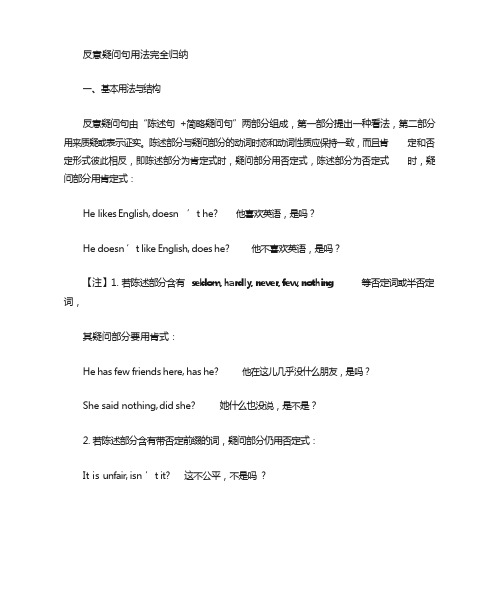
反意疑问句用法完全归纳一、基本用法与结构反意疑问句由“陈述句+简略疑问句”两部分组成,第一部分提出一种看法,第二部分用来质疑或表示证实。
陈述部分与疑问部分的动词时态和动词性质应保持一致,而且肯定和否定形式彼此相反,即陈述部分为肯定式时,疑问部分用否定式,陈述部分为否定式时,疑问部分用肯定式:He likes English, doesn ’t he? 他喜欢英语,是吗?He doesn ’t like English, does he? 他不喜欢英语,是吗?【注】1. 若陈述部分含有seldom, hardly, never, few, nothing 等否定词或半否定词,其疑问部分要用肯式:He has few friends here, has he? 他在这儿几乎没什么朋友,是吗?She said nothing, did she? 她什么也没说,是不是?2. 若陈述部分含有带否定前缀的词,疑问部分仍用否定式:It is unfair, isn ’t it? 这不公平,不是吗?It is impossible, isn ’t it? 那是不可能的,是吗 ?二、反意疑问句的主语问题1.基本原则:疑问部分的主语应与陈述部分主语一致,且只能是代词:Mary is a nurse, isn’t she? 玛丽是护士,对吗?2.当陈述部分为there be 句型时,疑问部分仍用there 作“主语”:There was nothing in the room, was there? 房间里什么也没有,是吗?3.当陈述部分的主语是指示代词时,疑问部分用it, they 等代词:That is a new car, isn ’t it? 这是一辆新汽车,是吗?4.当陈述部分的主语是复合不定代词时,若陈述部分的主语为somebody, someone, everyone, everybody, no one, nobody 等复合不定代词,其反意疑问句的主语在正式文体中用he ,在口语或非正式文体中通常用they :Nobody was late, were they? 没有一个人迟到,是吗 ?5.当陈述部分的主语是something, anything, nothing, everything 等复合不定代词时,其反意疑问句的主语要用it:Everything is ready, isn ’t it? 一切都准备好了吗?Nothing is important, is it? 没有什么重要的,不是吗 ?三、陈述部分有动词 have 的反意疑问句1.当have 为助动词时,其反意疑问句沿用同样的助动词:He has already left, hasn ’t he? 他已经离开了,是吗 ?2.当 have 为实意动词时,要分两种情况:①若表示“所有”,反意疑问句可以用h ave,也可以用do:He has a lot of friends here, hasn ’t [doesn ’t] he? 他在这儿有许多朋友,是吗?但是若陈述部分用的是have 的否定式,反意疑问句用have 还是用 do,取决于陈述部分的动词形式:He hasn ’t any money, has he? 他没有钱,是吗 ?He doesn ’t have any money, does he? 他没有钱,是吗 ?②若表示“吃”、“玩”等意思,反意疑问句要用do:He has supper at 5, doesn ’t he? 他 5 点吃晚餐,是吗 ?He had a good time at the party, didn ’t he? 他在晚会上玩得很开心,是吗 ?3.当用于have to 时,通常也有两种可能:若表示经常性的行为,则多用加助动词do 的形式;若表示特定的行为,则多用have :He often has to get up early, doesn ’t he? 他经常要早起,是吗?He has to go to bed late tonight, hasn ’t he? 他今晚要迟睡,是吗 ?四、含情态动词的反意疑问句1.基本原则:在通常情况下,当陈述部分含有情态动词时,疑问部分会重复前面同样的情态动词:He can speak English, can ’t he ?他会说英语,是吗?Weshouldn ’t go, s hould we? 我们不应该去,对不对?2.当陈述部分含有must 时,要分两种情况:①若must表示“必须”或“有必要”,疑问部分用mustn’t或needn’t:Y ou must leave at once, mustn ’t [needn ’t] you? 你必须(有必要) 马上离开,是吗 ?但是若陈述部分有 mustn ’t 表示禁止,疑问部分要must :Y ou mustn ’t laugh, must you? 你不准笑,知道吗 ?② 若 must 表示推测,疑问部分不能用 must ,而应根据 must 后的动词结构采用相应的动词形式:He must be tired, isn ’t he? 他一定累了,是吗 ?五、陈述部分为祈使句的反意疑问句1.基本原则:若陈述部分为祈使句,疑问部分通常用will you :Please help us, will you? 请帮帮我们,好吗?Come with us, will you? 同我们一起去,好吗?Don’t forget to p ost the le t t er, will you? 请别忘了寄信。
反义疑问句

反义疑问句的12种特殊句型1.在由祈使句+疑问部分构成的反义疑问句中,疑问部分通常用will you, won’t you, would you,有时也可以用can you , can’t you, why don’t you, could you等,但不用do,即使祈使句中有助动词do 时也是这样,Pass me the dictionary, will (would)you?Don’t do that again, will you?在含有let的祈使句后的反义疑问句部分,如果let 的宾语us包括听者(常写为let’s)时用shall we,不包括听者(常写为let us)时用will you. Let的宾语是me时,要根据意思用will you或may I 。
let 的宾语是第三人称时用will you .Let him speak first,will you ?2.当陈述部分带有情态动词must 时,反义疑问部分要根据Must的意思不同而有所变化。
如果must 表示必须,有必要时,反义疑问部分用musn’t 或neen’t .如I must hand in my exercise book now,must’t I (needn’t I )?如果must n’t 表示禁止时,疑问部分一般用mustYou mustn’t take the magazine out of the reading room,must you ?若must 表示想必,一定等推测意义时,则疑问部分不用must,而要根据must 之后的动词结构及含义使用相应的动词形式。
如:He must be your English teacher, isn’t he ?Chinese must have the largest number of speakers, doesn’t it ?You must have read read the book yesterday , didn’t he?3.当陈述部分的主语为nothing , anything, everything等不定代词时,反义疑问部分主语用it ,如:Nothing could prevent him from going there, could it?如果陈述部分的主语为nobody,somebody,none,someone,no one,anyone,anybody,everyone等不定代词,反义疑问部分主语用they 或he,如:Somebody took my umbrella away yesterday, didn’t they/he ?4.当陈述部分带有that从句作宾语时,反义疑问部分应与主句的主语和谓语一致。
- 1、下载文档前请自行甄别文档内容的完整性,平台不提供额外的编辑、内容补充、找答案等附加服务。
- 2、"仅部分预览"的文档,不可在线预览部分如存在完整性等问题,可反馈申请退款(可完整预览的文档不适用该条件!)。
- 3、如文档侵犯您的权益,请联系客服反馈,我们会尽快为您处理(人工客服工作时间:9:00-18:30)。
反义疑问句句型归纳1、You had no time for reading, did you ? \ had you?2、He has a bro ther, hasn’t he, \ doesn’t he?3、We have to go without him, don’t we ?4、You have you r dinner at school, don’t you?5、He has a res t every two hours, doesn’t he?6、This is your last chance to learn from the beginning, isn’t it?7、Those were terrible days f or us to recall, weren’t they?8、There are some books you ar e interested in, aren’t there?9、Let us do it as we please \ like to, will you? \ can you?10、Let’s us do it right now, shall we? \ can we?11、Come here, will you? \ won’t you \ can you \ c an’t you \ do you \ don’t you?12、Don’t say anything, will you? \ can you? \ do you?13、Tom, you clean the window, will you?14、I think \ say \suppose \ guess \ am sure he will come back soon, won’t he?15、I don’t think he will come back , will he?16、He old man never thought he was lonely, did he?17、The old man used to be a f armer, usedn’t he \ didn’t he?18、He ought to come, oughtn’t he \ shouldn’t?19、He seldom goes to the cinema, doesn’t he?( hardly, never, few, little, nothing, nobody)20、It’s unfair, isn’t it?21、One can’t be car eful enough, can one \ can he?22、Eve rything goes well, doesn’t it?23、Everybody agrees with him, doesn’t he \ don’t they?24、All we needed has been bought, hasn’t it?25、All we invited have arrived, haven’t they?(All refers to people)26、Learning E nglish is very hard, isn’t it?27、He studies hard and he is often prai sed by his teachers, isn’t he?28、We must be more polite in this occasion, needn’t we?29、He m ust be a brave man, isn’t he?30、It must have rained last night, didn’t it?31、He mush hav e known the answer, hasn’t he?32、He can’t have done such a foolish thing, has he?33、I am a student, aren’t I ?34、So he has known the secret, has he?35、Oh, you have the same type of sell phone as I, do you?一、反意疑问句的意义及其构成反意疑问句又叫附加疑问句,是指当提问的人对前面所叙述的事实不敢肯定,而需要向对方加以证实时所提出的问句。
其结构为:前一部分是一个陈述句,后一部分是一个简单的问句。
完成后一部分简单问句时,要根据前面陈述句的动词时态和人称来选择适当的助动词进行提问,前后两部分的人称和动词时态要保持一致。
如果前一部分用肯定式,后一部分一般用否定式;反之,前一部分为否定式,后一部分要用肯定式,即“前肯定后否定,前否定后肯定”。
例You have been to Beijing, haven’t you? 你去过北京,是吗?二、简单句式结构中反意疑问句的运用反意疑问句运用于简单句式结构中时,应注意掌握以下几个方面1、当陈述句部分的主语是名词时,反意疑问句的主语必须用人称代词来代替。
例Your brother has gone to the library, hasn’t he?你弟弟去图书馆了,是吗?2、当陈述句的主语是指示代词this, that时,反意疑问句的主语用it 代替;指示代词是these, those时,反意疑问句的主语用they代替。
例That isn’t a useful book, is it? 那不是一本有用的书,是吗?These are important reading materials, aren’t they?这些都是重要的阅读材料,是吗?3、当陈述句部分是I am…时,反意疑问句部分通常要用aren’t I;如陈述句部分的主语是I am not时,反意疑问句部分通常要用am I。
例I’m late for the meeting, aren’t I? 我开会迟到了,是吗?I’m not doing well, am I? 我干得不好,是吗?4、当陈述部分是everyone / everybody, someone / somebody, no one / nobody, none等表示人的不定代词时,反意疑问句部分的主语多用they,但也可用he;当陈述部分的主语是everything, anything, something, nothing等表示物的不定代词时,反意疑问句部分的主语用it。
例Nobody came when I was out, did they?我在外时,没人来过,是吗?Everything has gone wrong today, hasn’t it?今天什么都出问题了,是不是?5、当陈述部分是“there be + 主语+ 其它”结构时,反意疑问部分要用“be (not) + there”结构。
例There are some bananas in the basket, aren’t there?篮子里有些香蕉,是吗?6、当陈述部分的谓语动词是have时,有两种情况。
1)have作“有”解时,反意疑问句部分可用have(not)或do(not)的相应形式。
例His brother has a new bike, hasn’t (doesn’t) he?他弟弟有一辆新自行车,是吗?2)have用作实义动词时,反意疑问句部分只可用do(not)的相应形式。
例We have to start early, don’t we? 我们必须早点出发,是吗?7、当陈述部分有hardly, scarcely, barely, rarely, seldom, few, little, no, never, nothing, nobody, nowhere等否定词或半否定词时,反意疑问句部分要用肯定形式。
注如果陈述句部分是带有否定前缀或后缀时,反意疑问句部分仍用否定结构。
例It’s impossible for him to make such a mistake, isn’t it? 他不可能犯这样的错误,是吗?8、当陈述部分有情态动词ought to时,反意疑问句部分要用ought / should (ought n’t / shouldn’t);如陈述部分为情态动词used to,反意疑问部分可用used或did;如陈述部分为had better,反意疑问部分用hadn’t或shouldn’t。
例Such things ought not to be allowed, ought they? 这种事是不允许的,是吗?You’d better do it by yourself, hadn’t / shouldn’t you? 你最好自己做,好吗?9、当陈述句部分有情态动词must时,反意疑问部分有四种情况(1)must表示“必须、禁止“时,反意疑问部分要用must (mustn’t) 。
例You mustn’t stop your car here, must you?你不能把车停在这地方,知道吗?(2)must表示“有必要”时,反意疑问句部分要用needn’t。
例They must finish the work today, needn’t they?他们今天必须要完成这项工作,是吗?(3)当must用来表示对现在的情况进行“推测”时,反意疑问部分要根据must后面的动词采用相应的形式。
例He must be good at maths, isn’t he?他数学一定学得很好,是吗?(4)当must用来表示对过去的情况进行“推测”(must + have done)时,如强调对过去情况的推测(一般句中有过去的时间状语),反意疑问句部分要用“didn’t + 主语”;如果强调动作的完成(一般没有过去时间状语),反意疑问句部分要用“haven’t / hasn’t + 主语”。
例She must have read the novel last wee k, didn’t she?她上星期一定读了这本小说了,是吗?You must have told her about it, haven’t you?你一定把这事告诉她了,是吗?10、当陈述部分的谓语动词是表示愿望的wish时,反意疑问部分要用may,而且前后两个部分均用肯定式。
例I wish to go to the moon by spaceship some day, may I? 。
